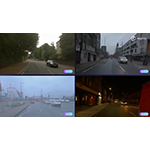- Self-driving technology company Wayve has published a technical report today detailing its cutting-edge generative world model for autonomy, GAIA-1.
- GAIA-1 is the first generative world model designed specifically for autonomous driving, developed from Wayve’s vast corpus of real-world driving data.
- GAIA-1 is a true world model that can generate realistic future driving scenarios using video, text, and action inputs and offers fine-grained control over ego-vehicle behaviour and scene features.
LONDON–(BUSINESS WIRE)–#GAIA1–Wayve, the leading developer of AI-powered self-driving technology, has published a technical report today detailing their generative world model, GAIA-1 (Generative AI for Autonomy), previewed in June 2023. This research model was developed to enhance and accelerate the training of Wayve’s end-to-end AI software for autonomous driving.
Generative world models hold significant promise to advance deep learning for robotics applications such as self-driving cars. World modelling can help AI models learn general representations of how the world works and how to predict what might happen next. Like how people use mental models to make sense of the world and guide their actions, embodied AI systems could benefit from world models like GAIA-1. These models could help autonomous vehicles better understand their surroundings, allowing them to efficiently anticipate and plan their driving actions.
GAIA-1 is the first generative world model designed specifically for self-driving systems. It was introduced earlier this year and builds on Wayve’s research in future prediction, dreaming about driving, predicting in a bird’s eye view and learning a world model. The 9-billion parameter model was trained on approximately 4,700 hours from Wayve’s corpus of UK driving data. It leverages video, text and action inputs to generate realistic driving scenarios while offering fine-grained control over ego-vehicle behaviour and scene features. GAIA-1 provides Wayve with a versatile and powerful tool to advance the training and validation of safer and more intelligent autonomous systems.
The uniqueness of GAIA-1 lies in its ability to merge the predictive capabilities of world models with the scalability and realism of state-of-the-art generative AI techniques. By bridging these two worlds, GAIA-1 combines the advantages of both approaches, creating simulated driving videos that closely mirror real-world conditions not only in visual realism but in their accurate representation of the behavioural patterns of the ego-vehicle and other dynamic elements within the scene. GAIA-1 has shown impressive accuracy in its ability to comprehend important concepts for driving, like distinguishing between cars, trucks, buses, pedestrians, cyclists, road layouts and traffic behaviours—setting it apart from other video generation models.
Wayve is currently testing its self-driving technology daily on UK roads and is undertaking Europe’s largest last-mile autonomous grocery delivery trial with the UK’s second-largest online supermarket, Asda. The company recently unveiled another first-of-its-kind AI model, LINGO-1, that uses natural language to comment on driving scenes and explain its decision-making. Developments like LINGO-1 and GAIA-1 pave the way to significant advances in the field of autonomy, which can help self-driving cars better understand and predict their surroundings. This could represent a significant leap forward in making their safe deployment a reality.
Alex Kendall, Co-founder and CEO of Wayve, said: “I’m impressed by GAIA-1’s ability to offer precise control over dynamic driving and scene features, including the way other agents in the scene react to the vehicle that’s driving. This future prediction capability makes GAIA-1 truly representative of real-world driving. The diverse array of driving videos we can generate with this model makes it ideal for research, training and validation of autonomous driving systems.”
“But the significance of GAIA-1 extends beyond its generative capabilities. GAIA-1’s incorporation of world models represents a crucial step towards achieving autonomous systems that can understand, predict, and adapt to the complexities of the real world. This holds immense promise for improving the safety and robustness of autonomous vehicles and their ability to handle diverse and dynamic environments.”
Yann LeCun, VP and Chief AI Scientist at Meta and Wayve Investor, said: “I’ve been advocating the idea of world models and planning for many years, and Wayve’s GAIA-1 model is an impressive demonstration of how well this works in the context of autonomous driving.”
For more information on GAIA-1, please check out Wayve’s blog.
—–
About Wayve
Wayve is on a mission to reimagine autonomous mobility through embodied intelligence. Founded in 2017, Wayve is made up of a global team of experts in machine learning and robotics from top organisations around the world. We were the first to deploy autonomous vehicles on public roads with end-to-end deep learning, pioneering the AI software, lean hardware, and fleet learning platform for AV2.0: a next-generation autonomous driving system that can quickly and safely adapt to new driving domains anywhere in the world.
Wayve has raised over $258M and is backed by Eclipse Ventures, D1 Capital Partners, Baillie Gifford, Moore Strategic Ventures, Balderton Capital, Virgin, and Ocado Group. The team is based in London and California, with a fleet of vehicles testing in cities across the UK. Wayve aims to be the first to deploy autonomy in 100 cities. To learn more, visit www.wayve.ai.
Contacts






